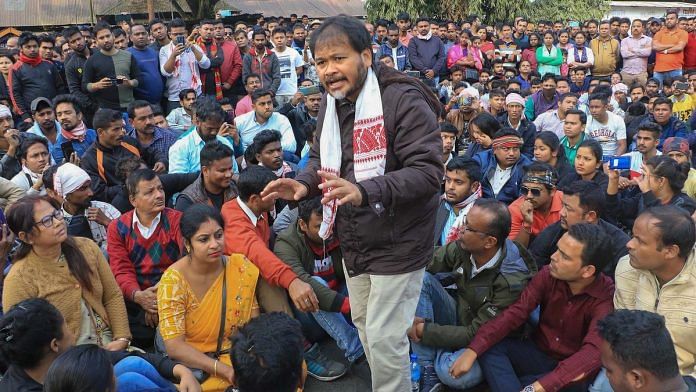New Delhi: The Gauhati High Court, which Thursday denied bail to activist Akhil Gogoi, said in its judgment he “led violent protests” during the anti-CAA agitation that were aimed to strike terror in all sections of people in India, irrespective of caste, creed and religion.
A division bench of Justice Kalyan Rai Surana and Justice Ajit Borthakur said Gogoi had “brushed aside the noble concept of a non-violent protest, popularly known as satyagraha” as he allegedly led a mob that indulged in violence.
Such conduct of paralysing government machinery, causing economic blockade, causing enmity between groups, disruption of public peace on widespread disharmony and disaffection towards the government squarely fall within the definition of “terrorist act” as defined under the Unlawful Activities (Prevention) Amendment Act (UAPA), the court said.
It also relied on statements of two protected police witnesses to observe that members of the Krishak Mukti Sangram Samiti (KMSS), an organisation founded by Gogoi, were trained by the banned CPI(Maoist) in tactics of mass mobilisation to carry out seditious activities in garb of protest activities.
Gogoi is facing UAPA charges for spearheading anti-CAA protests in Assam in December 2019 and has been in jail for over a year.
According to Gogoi’s lawyer, Shantanu Borthakur, the Assam Police registered 14 criminal cases against the activist in connection with the protests, six of them under UAPA sections.
Two cases, including the one decided on Thursday, were probed by the central agency, the National Investigation Agency (NIA).
Borthakur said Gogoi is already on bail in 13 cases.
“Allegations in all the cases are similar. However, in the one decided Thursday, the NIA has alleged Gogoi had links with Maoists, which we have contested. CPI(Maoist) was not a banned outfit before 2008,” Borthakur told ThePrint. He said the HC order will be challenged before the Supreme Court.
Also read: RTI, triple talaq, UAPA — petitions linked to 3 key matters heard only once in SC since 2019
Gogoi wanted to disrupt all modes of rail and road transport
Based on the material placed before it, including a chargesheet running into over 1,200 pages, the court said it is unable to hold that the violent protests throughout the state “did not or could not have had any terrorising effect on the harmony of innocent public”.
Gogoi’s arguments that his strike call and speeches during the anti-CAA protests fell within freedom of speech and expression stood rejected.
After considering the transcripts accompanying the chargesheet, the court held it was clear that Gogoi wanted to disrupt all modes of rail and road transport through his protests.
The purpose behind the protests was to paralyse the government machinery, specifically when Japan’s Prime Minister was stated to visit Assam, the court said.
On Gogoi’s contention that the Railways itself had suspended rail traffic, the court said the said action was taken to secure lives of a large number of rail users and also save railway property from being damaged by violent protesters, who reportedly burnt down Chabua railway station.
‘Fundamental duty to protest peacefully’
Quoting Article 51-A of the Constitution, the court asserted it was the fundamental duty of every person to safeguard public property and avoid any kind of violence during protests.
Resorting to violence during the protests is a breach of key fundamental duty of citizens, who should exercise their right to freedom of speech within the restrictions imposed by Article 19 (2) of the Constitution, the bench said.
“The act of blocking of the public road, disrupting free flow of essential goods to the public and the state, setting fire to public offices and vehicles in the garb of public protest certainly cannot be termed as peaceful democratic protests in law,” the court held.
Prima facie, the court also said, the evidence produced against Gogoi may be sufficient to convict him. However, it clarified that this observation was limited for the purposes of deciding his bail plea and would have no bearing at the time of the trial.
Also read: All about Assam’s new bill that will convert govt-aided madrasas to regular schools



